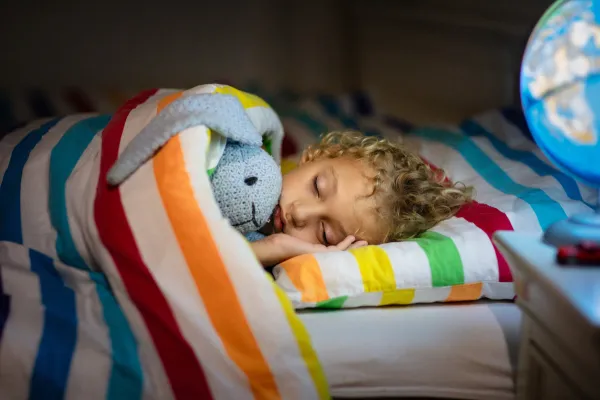Stay Informed With the Latest Insights and Resources
Our team of experts shares valuable tips, success stories, and practical advice to support you on your wellness journey.
Stay Informed With the Latest Insights and Resources
Our team of experts shares valuable tips, success stories, and practical advice to support you on your wellness journey.

Why a Good Night’s Sleep is Important and How to Get There
Stages Of Sleep And How They Support Good Health
We tend to take sleep for granted without fully realizing the complex processes taking place. Through the course of the night, you go through several stages of sleep, each with its own purpose. Generally speaking, sleep is divided into two stages:
Rapid eye movement (REM)
Typically occurring after the first 90 minutes of sleep, this is the stage when you’re more likely to have vivid dreams. Your eyes move quickly (hence the name) and your heartbeat raises. Many people experience temporary muscle paralysis. REM sleep supports memory, mood, and cognitive function, and some studies have connected a lack of REM sleep with a reduced coping ability. Interestingly, the amount of REM sleep we get each night tends to decline with age.
Non-rapid eye movement (NREM)
NREM is further broken down into three stages:
NREM 1: the first stage of sleep, which is a very light sleep.
NREM 2: about half of a typical night’s sleep is spent in this stage, which is slightly deeper than NREM 1.
NREM 3: this is the deepest stage of sleep, during which heart rate, breathing, and other bodily processes slow down. It can be hard to wake someone up from NREM 3. It’s primarily at this stage that your body performs the restorative functions of sleep, including strengthening the immune system and repairing tissue.
Consequences Of Poor Sleep
The long-term impact of poor sleep extends far beyond feeling a bit groggy the next day. Some consequences include:
Cognitive Impairment: Lack of sleep can hinder concentration, memory, and decision-making skills, affecting academic performance.
Behavioral Issues: Sleep deprivation is often linked to irritability, mood swings, increased stress, and problems with impulse control, which can lead to disciplinary issues both at home and in school.
Emotional Problems: Insufficient sleep can increase the risk of depression, anxiety, and other emotional disturbances in children.
Immune System Suppression: Poor sleep can weaken the immune system, making children more susceptible to infections and illnesses.
Growth Issues: Sleep is crucial for the release of growth hormone; thus, inadequate sleep can affect a child's physical development.
Obesity: Lack of adequate sleep can lead to hormonal imbalances that increase hunger and appetite, often resulting in weight gain.
Reduced Academic Performance: Consistent lack of sleep affects a child's ability to learn, concentrate, and perform academically.
Social Difficulties: Sleep-deprived children may have a harder time interacting with peers due to moodiness or behavioral problems, impacting their social skills and relationships.
Protecting Their Sleep
So how can we prevent these common sleep disruptors from impacting our kids' health? The following tips can help you take a more proactive approach to ensuring your children are getting a good night’s sleep.
Make sleep a priority.
This simple mind shift can have a big impact. Aim for 7 - 9 hours of restful sleep a night and prepare for sleep in a routine fashion so that it becomes more of a priority.
Create a sleep-friendly environment.
Treat any bedroom like a sanctuary, and avoid doing other things in there. Keep the temperature moderate (cooler is better), and reduce noise as much as possible. If there is a lot of environmental noise, try a white noise machine and black out curtains to keep the room as dark as possible.
Maintain a consistent routine.
Our bodies like regular hours for sleep. We’re often programmed to stay up later and sleep in on the weekend, but maintaining a regular schedule for your kids and protecting the circadian rhythm is better in the long run. We all should be able to wake up naturally without setting an alarm - if it takes several repeats of the snooze alarm, we need to adjust bedtime to an earlier time.
It’s difficult to switch from our fast-paced waking lives to a restful state conducive to sleep. Honor this transition by avoiding stimulating activities right before bed in favor of more restful activities like reading or having a warm bath.
Avoid blue-light emitting devices.
The light emitted from electronic devices is composed of blue wavelengths. This light can slow the production of melatonin, the sleep-inducing hormone. Think of it this way: our eyes associate the blue light of daytime with wakefulness, and as that light fades as the day ends, they send a signal to produce more melatonin. When a device also emits blue light, our eyes are tricked into thinking it’s the middle of the day. Minimize this effect by avoiding LED screens for two to three hours before bedtime. On a similar note, do not keep cell phones beside the bed. (If you use it for the alarm, simply buy an alarm clock.) This can prevent the urge to check notifications and will also reduce EMF (Electromagnetic Frequencies) exposure emitting from your device. Studies are ongoing, but research shows that daily occupational EMF exposure may be associated with poor sleep quality.
Exercise during the day.
Exercise is one of the most helpful things to improve sleep. Avoid overtraining, which can lead to insomnia, and ensure there is no vigorous exercise too late. Many people find some light stretching or yoga in the evening helps with sleep. Have your kids try an inversion yoga pose like “legs on the wall” to help get their bodies into a restful and relaxed state.
Try magnesium
Magnesium is a vital mineral that plays several crucial roles in the body, and it can be particularly beneficial in promoting better sleep for children. Here’s how magnesium may help kids sleep:
Regulation of Sleep Hormones: Magnesium helps regulate neurotransmitters, which are involved in signaling in the nervous system, and it directly influences the production of melatonin, a hormone that guides the sleep-wake cycles of the body.
Muscle Relaxation: It helps relax the muscles, which can be beneficial before bedtime. Magnesium assists in the function of GABA receptors in the brain. GABA (gamma-aminobutyric acid) is a neurotransmitter that promotes relaxation and is essential for sleep.
Stress Reduction: Magnesium has been known to have a calming effect on the nervous system. It can help manage stress levels, which is important because stress and anxiety can often interfere with sleep.
Sleep Quality Improvement: Studies suggest that magnesium can improve the quality of sleep in children as well as adults. This includes longer sleep times, easier time falling asleep, and fewer early morning awakenings.
Reduction of Restless Leg Syndrome: For children who experience Restless Leg Syndrome (RLS), which can disrupt sleep with uncomfortable sensations in the legs, magnesium may help alleviate these symptoms.
Before starting any supplement, it's important to consult with a pediatrician, as the proper dosage of magnesium can vary based on the child's age, weight, and overall health. Additionally, an excess of magnesium from supplements can lead to side effects like diarrhea, so it’s important to follow recommended guidelines and consider dietary sources of magnesium as well. Foods rich in magnesium include nuts, seeds, whole grains, beans, leafy green vegetables, and milk.
Don’t overlook the importance of sleep in our overall health. If your child’s sleep is not restoring their body daily, they can be setting their day up for a roller coaster of issues. Need help with your child’s sleep routine, behavior issues and more Book a Better Brain Consult. We can help determine the root cause of their health issues and put them on a plan to help you be restored, vibrant and resilient.
Sources
Chattu VK, Manzar MD, Kumary S, Burman D, Spence DW, Pandi-Perumal SR. The Global Problem of Insufficient Sleep and Its Serious Public Health Implications. Healthcare (Basel). 2018;7(1):1. Published 2018 Dec 20. doi:10.3390/healthcare7010001
Medic G, Wille M, Hemels ME. Short- and long-term health consequences of sleep disruption. Nat Sci Sleep. 2017;9:151-161. Published 2017 May 19. doi:10.2147/NSS.S134864
Peever J, Fuller PM. Neuroscience: A Distributed Neural Network Controls REM Sleep. Curr Biol. 2016;26(1):R34-R35. doi:10.1016/j.cub.2015.11.011
Krause AJ, Simon EB, Mander BA, et al. The sleep-deprived human brain. Nat Rev Neurosci. 2017;18(7):404-418. doi:10.1038/nrn.2017.55
Ian G. Campbell, PhD; Alejandro Cruz-Basilio, BA; Jessica G. Figueroa, BS; Vincent B. Bottom, BA
Ian G. Campbell, Earlier Bedtime and Its Effect on Adolescent Sleep Duration
UC Davis Department of Psychiatry and Behavioral Sciences, 2230 Stockton Blvd, Sacramento, CA 95817. Pediatrics (2023) 152 (1): e2022060607.
Judith Owens, MD; ADOLESCENT SLEEP WORKING GROUP; COMMITTEE ON ADOLESCENCE; Rhoda Au, PhD; Mary Carskadon, PhD; Richard Millman, MD; Amy Wolfson, PhD; Paula K. Braverman, MD; William P. Adelman, MD; Cora C. Breuner, MD; David A. Levine, MD; Arik V. Marcell, MD; Pamela J. Murray, MD; Rebecca F. O’Brien, MD Pediatrics (2014) 134 (3): e921–e932.
Dorrian J, Centofanti S, Smith A, McDermott KD. Self-regulation and social behavior during sleep deprivation. Prog Brain Res. 2019;246:73-110. doi: 10.1016/bs.pbr.2019.03.010. Epub 2019 Apr 10. PMID: 31072564.
Blume, Christine et al. “Effects of light on human circadian rhythms, sleep and mood.” Somnologie : Schlafforschung und Schlafmedizin = Somnology : sleep research and sleep medicine vol. 23,3 (2019): 147-156. doi:10.1007/s11818-019-00215-x
Liu H, Chen G, Pan Y, Chen Z, Jin W, et al. (2014) Occupational Electromagnetic Field Exposures Associated with Sleep Quality: A Cross-Sectional Study. PLOS ONE 9(10): e110825. https://doi.org/10.1371/journal.pone.0110825
